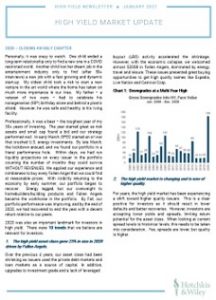________________________________________
All investments contain risk and may lose value. This podcast is for general information only and should not be relied on for investment advice or recommendation of any particular security, strategy, or investment product.
The portfolio manager’s views and opinions expressed in this podcast are as of January 21, 2021. Such views are subject to change and may differ from others in the firm, or the firm as a whole. The portfolio manager’s comments include some estimated and/or forecasted views, which are believed to be based on reasonable assumptions within the bounds of current and historical information. However, there is no guarantee that any estimates, forecasts or views will be realized. In the event of new information or changed circumstances, H&W reserves the right to change its investment perspective and outlook and has no obligation to provide revised assessments and opinions.
The portfolio manager’s views on the high yield market should not be construed as the high yield strategy’s expected performance. There is no guarantee of the future performance of the high yield market, nor the high yield strategy. H&W does not provide any assurance that the high yield strategy’s objectives and goals will be achieved.
Investing in high yield securities is subject to certain risks, including market, credit, liquidity, issuer, interest-rate, inflation, and derivatives risks. Lower-rated and non-rated securities involve greater risk than higher-rated securities. Investing in debt securities typically decreases in value when interest rates rise. This risk is usually greater for longer-term debt securities. Investing in smaller and/or newer companies involves greater risks than those associated with investing in larger companies, such as business risk, significant stock price fluctuations and illiquidity.
Market Disruption: The recent global coronavirus pandemic has caused and continues to cause disruption in the global economy, unprecedented business and travel disruption and extreme fluctuations in global capital and financial markets. H&W is unable to predict the consequences of the upheaval caused by coronavirus pandemic, which, depending on the severity and the length of the outbreak, has the potential to negatively impact the firm’s investment strategies and reduce available investment opportunities.
©2023 Hotchkis & Wiley. All rights reserved. No portion of the podcast may be published, reproduced, transmitted or rebroadcast in any form without the express written permission of H&W.
Past performance is not indicative of future performance.


